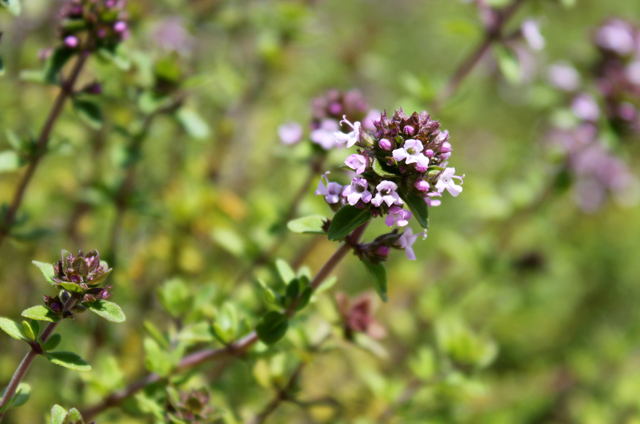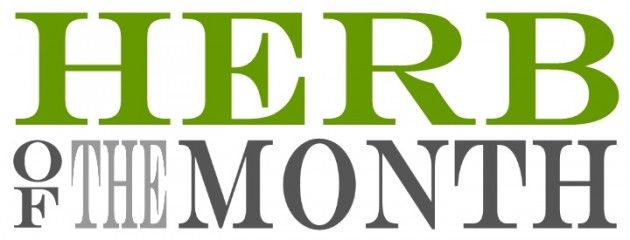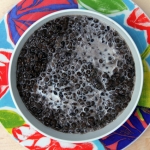Thyme (Thymus vulgaris)
useful for bronchitis, whooping cough, asthma, and urinary tract infections


I have little children at home who pick up every gucky respiratory bug that goes around. I often get flustered because I don’t have time to get sick every other week, but thank God I have thyme to beat it! I keep a tincture of thyme stocked in our family’s medicine cabinet, and I almost always put it in the herbal formulas I make for them when they are suffering from the dreaded common cold. When used as a tincture, it has a very sharp, bitter flavor that my husband detests.
Strong Antimicrobial
Thyme is one of nature’s best antimicrobials. After it’s ingested, the body excretes it via the lungs and the kidneys. This makes it particularly powerful in treating lung infections as well as kidney and urinary tract infections. Thyme also works as an antimicrobial agent in gastrointestinal infections and can be used topically for skin infections (even fungal ones!).
Excellent for Respiratory Infections
Thyme is a lung superhero when it comes to fighting off respiratory bugs, even for the scary whoop. It is especially helpful in the treatment of whooping cough because it has properties to stop the painful coughing fits that come with it. Thyme can be taken orally for its antimicrobial action, but its essential oil can be used in a steam inhalation or part of a vaporizing chest rub. I wish my doctor gave me thyme when I was in college, sick with asthmatic bronchitis. Instead, I got the conventional bronchitis goodies: antibiotics.
Quells Coughing Spasms
Inflammation in the lung tissue during a respiratory infection can cause the lungs to spasm in a way that results in unstoppable coughing bouts. The goal of the cough during a respiratory infection is to get all the gunk out. However, sometimes there’s no gunk to get out but the lungs are still inflamed. The inflammation in the lung tissue can cause it to spasm, which can result in you coughing. Thyme is anti-spasmodic, so it stops those spasms. This same anti-spasmodic property is also why thyme can be used in herbal formulas to treat asthma.
Ways to Use Thyme Leaves
Thyme’s powerful medicinal energy lives in its leaves. The botanical constituents found in thyme can be extracted in a tea, alcohol based tincture, or volatile oil (essential oil). Because fresh leaves are more potent than dried ones, a tincture made with fresh leaves may be more powerful then one made with dried ones. Thyme essential oil should be diluted in a carrier oil, unless applied to the feet.
Cautions
The main caution with thyme is its volatile oil form, otherwise known as its essential oil. When taken in excess, it is neurotoxic! If you have any kind of seizure disorder, do not use thyme essential oil. Avoid using thyme essential oil during pregnancy, both orally and topically.
If you would like to start taking thyme, please consult your naturopathic doctor. A licensed healthcare practitioner can tailor the dose according to your needs.
References:
Yarnell, Eric. Botanical Medicine IV. Bastyr University. Fall 2008.
Enjoy More Archerfriendliness
No? Well, you may have been bitten by its cousin, the fever phobic bug. The fever phobic bug can go after anyone, but the fever phobic mama bug likes to feed on mamas. In this post, I will focu...
I recently mentioned that I eat several raw garlic cloves a day when I feel the sick coming on. You may have pictured me popping raw garlic cloves like breath mints every time I feel the hint of a...
Last week, my 3 year old daughter needed her blood drawn in order to run some laboratory tests. Because my first childhood needle experience was more like a horror scene with 4 nurses, a doctor, a...







